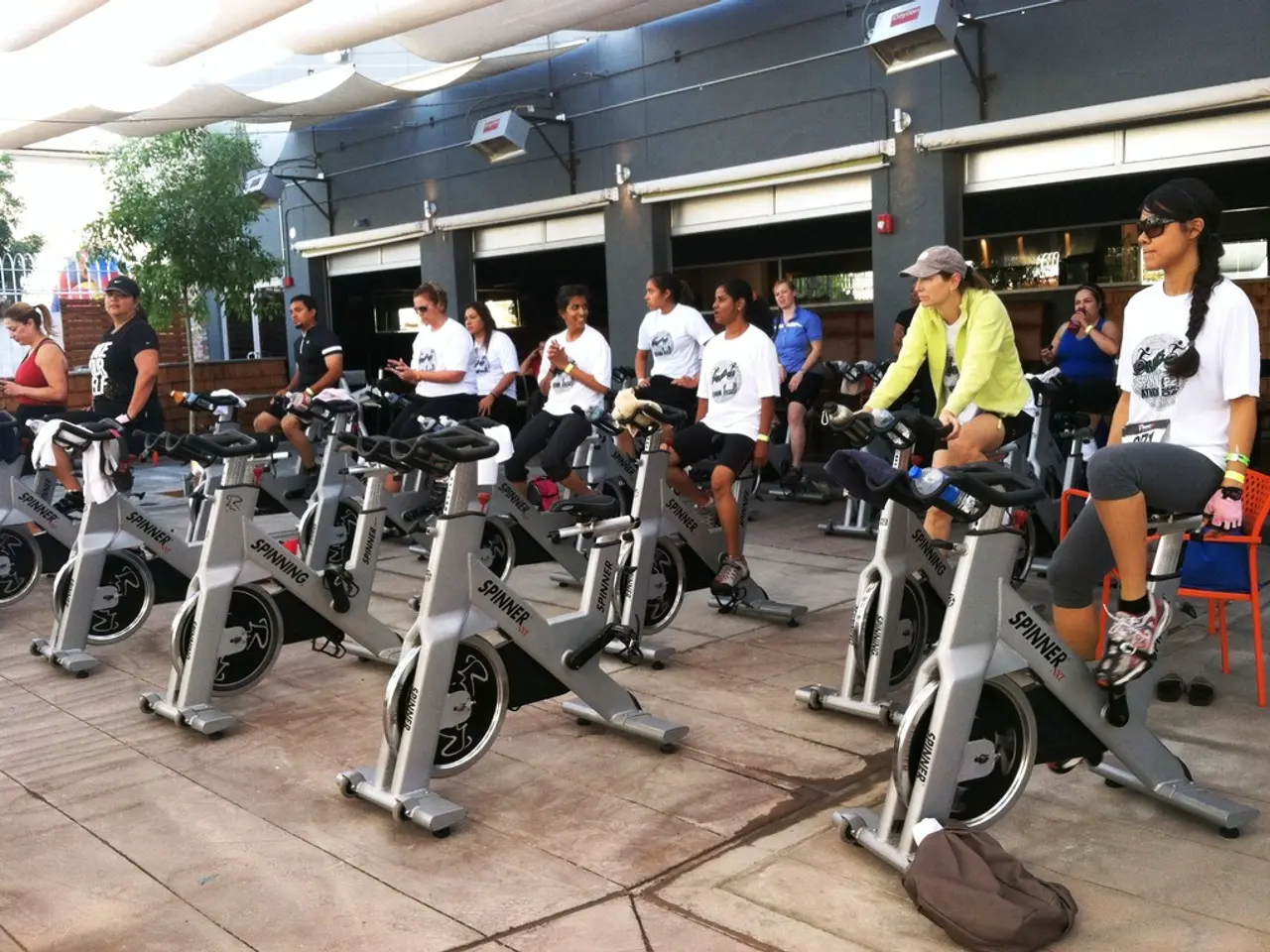Revitalizing Metabolism at Age 40: Strategies for an Efficient Approach
In our quest to maintain a healthy lifestyle, understanding the importance of metabolism becomes crucial, especially as we age. Here are some effective strategies to enhance metabolism after the age of 40.
Strength Training
Resistance exercises, such as weightlifting or bodyweight resistance exercises, are key to increasing muscle mass. This, in turn, raises the Basal Metabolic Rate (BMR) because muscle tissue burns more calories at rest than fat. Incorporating strength training one to two times weekly can significantly boost metabolism[1][3][4].
Protein Intake
Eating more protein not only boosts calorie burn through digestion but also helps preserve muscle mass that naturally declines with age. Aim for about 20-30 grams of protein per meal or roughly 0.7 to 1 gram of protein per pound of ideal body weight, depending on activity level[1][2].
Cardio and HIIT
Cardiovascular exercises like running or cycling improve overall calorie burn and heart health. High-Intensity Interval Training (HIIT), which involves bursts of intense activity alternating with rest, extends metabolic rate elevation for hours post-workout, making it time-efficient for fat loss and metabolism boost[3][4].
Hydration
Drinking at least 2 liters of water daily can temporarily increase resting metabolism, aiding calorie burn throughout the day[3].
Sleep and Stress Management
Good sleep supports hormonal balance and metabolism, while poor sleep slows metabolism and increases appetite. Stress management lowers cortisol, a hormone that can promote fat storage and reduce metabolic rate. Techniques like meditation, yoga, and improving sleep hygiene are beneficial[3].
As we age, we tend to lose muscle mass, which contributes to a slower BMR. Turning 40 can lead to a slowdown in metabolism due to changes in hormones. However, with these lifestyle changes, we can counteract these effects and maintain metabolic health.
Healthy Eating
Eating nutrient-rich foods, drinking green tea, and incorporating healthy fats like avocados and nuts can enhance energy levels naturally. Additionally, protein-rich foods, such as lean meats and Greek yogurt, help preserve muscle mass, which is crucial for a healthy metabolism. Spicy foods are also known to boost metabolism[2].
Mindfulness Practices
Mindfulness practices such as meditation or yoga can help manage stress, which is important for boosting metabolism.
Dehydration and Performance
Dehydration can lead to a 2% decrease in performance, affecting both physical and cognitive functions. Proper hydration can have a positive effect on metabolism, increasing it by up to 30% for about 30-40 minutes after drinking water[3].
Sleep Hygiene
Getting a consistent sleep schedule helps your body follow a daily rhythm, keeping hormones in balance. Aim for 7-9 hours of quality sleep every night to help maintain metabolic health.
In conclusion, small, sustainable adjustments in exercise, diet, hydration, and recovery create the most effective foundation for long-term metabolic health in middle age. By incorporating these strategies into our daily lives, we can maintain our energy levels, manage weight, and promote overall health well into our golden years.
[1] Mayo Clinic (2021). Boosting metabolism: 7 ways to rev up your metabolism. Accessed on 1st April 2023 from https://www.mayoclinic.org/healthy-lifestyle/consumer-health/in-depth/metabolism/art-20045167
[2] Healthline (2021). How to Boost Metabolism After 40. Accessed on 1st April 2023 from https://www.healthline.com/nutrition/how-to-boost-metabolism-after-40
[3] Harvard Health Publishing (2021). How to boost your metabolism. Accessed on 1st April 2023 from https://www.health.harvard.edu/staying-healthy/how-to-boost-your-metabolism
[4] Cleveland Clinic (2021). Boosting Metabolism: 5 Tips for Middle-Aged Adults. Accessed on 1st April 2023 from https://health.clevelandclinic.org/boosting-metabolism-5-tips-for-middle-aged-adults/
- Eating nutrient-rich foods, such as lean meats and avocados, along with protein-rich foods like Greek yogurt, can help preserve muscle mass, essential for a healthy metabolism.
- Incorporating mindfulness practices like meditation or yoga into your lifestyle can help manage stress, which is important for boosting metabolism.
- Dehydration, which can lead to a 2% decrease in performance, can also affect metabolism negatively, while proper hydration can increase it by up to 30% for about 30-40 minutes after drinking water.
- Incorporating strength training one to two times weekly can significantly boost metabolism, as resistance exercises like weightlifting or bodyweight resistance exercises raise the Basal Metabolic Rate (BMR) by increasing muscle mass.
- Eating more protein not only boosts calorie burn through digestion but also helps preserve muscle mass that naturally declines with age; aim for about 20-30 grams of protein per meal or roughly 0.7 to 1 gram of protein per pound of ideal body weight, depending on activity level.




